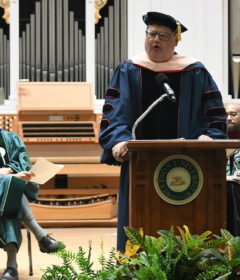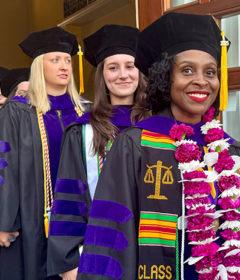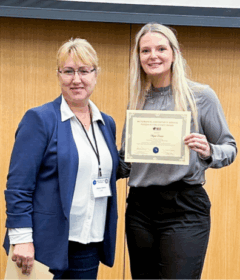Annual Holocaust Memorial Lecture by A. Dirk Moses sparks Conversation of Genocide
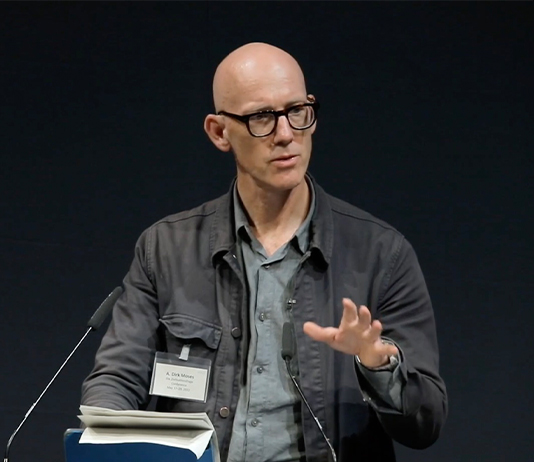
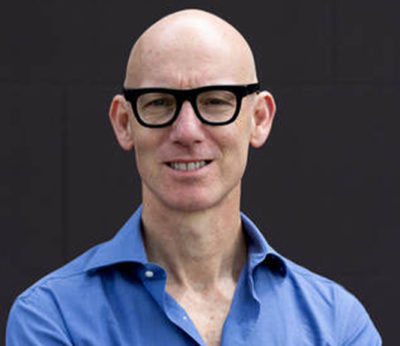
To a rapt audience of more than 125 people, A. Dirk Moses, PhD, the Anne and Bernard Spitzer professor of International Studies at The City College of New York, gave a compelling discourse during Stetson’s annual Holocaust Memorial Lecture on the meaning of genocide and an analytic interpretation of its application on modern human atrocities.
“The term ‘genocide’ is a claim-making praxis,” noted Moses during the April 20 event at the Stetson Room in the CUB (Carlton Union Building). He went on to explain that the term is a relatively new word, originally coined by Raphäel Lemkin in his 1944 book, “Axis Rule in Occupied Europe.”
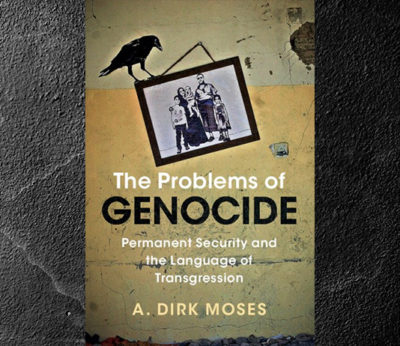
Drawing on his latest book, “The Problems of Genocide: Permanent Security and the Language of Transgression,” Moses acknowledged that his own way of looking at the term “genocide” has evolved from his earlier publications 20 years ago.
“When we speak of ‘genocide,’ the archetype is the Holocaust, which then becomes the gold-standard whenever something is labeled as a ‘genocide’,” he said. But Moses went on to argue that we need to examine invocations of the Holocaust and genocide in current domestic and international conflicts. What is the function of making Holocaust analogies and claiming that genocide is taking place? Why are they the “crime of crimes” rather than, say, crimes against humanity? Do they serve the purpose of bringing greater international attention and humanitarian interventions?
“The term ‘genocide’ just didn’t ‘stick’ with people when trying to apply it to later events in history like Vietnam. People just didn’t see it that way,” he explained. Moses believes that it is imperative to analyze the global moral and criminal vocabulary to explore its insights and deficiencies. The problems in the way genocide is defined and applied – and the flaws in the regime of international law based on those definitions – helps explain the lack of humanitarian interventions in places like Biafra, Ethiopia, Syria and the West Bank.
“I see it as a failure of recognition. Even if people die in these types of events that are crimes against humanity or civilian atrocities, we are not quick to call it ‘genocide’ because it does not meet the same criteria as the Holocaust,” said Moses. “That troubles me. I see all civilian casualties as worthy of our mourning.”
As the lecture came to a close, it ushered in a 40-minute robust Q & A from both in-person attendees as well as those who were watching the lecture via Zoom. As one attendee summarized, “History is messy. Words are neat.” And perhaps, therein, lies the root conflict.
Moses’ visit to Stetson was made possible by the Jewish Studies Program in collaboration with Campus Hillel, the College of Arts & Sciences, School of Business, School of Music, Department of History, Department of Religious Studies, Department of Philosophy, the Program in Russian, East European and Eurasian Studies, and the Honors Program.
The roots of Stetson’s annual Holocaust Memorial Lecture date back to 2008 when Professor Emeritus Grady Ballenger, PhD, then dean of the College of Arts and Sciences, contacted the U.S. Holocaust Memorial Museum in Washington, D.C., to seek their help in bringing Holocaust lecturers to Stetson. Ballenger was one of many in attendance at the April 20 event.
Soon after, the Bernard Weiner Memorial Holocaust Lecture was founded at Stetson and funded for many years by Dr. Sy Weiner of DeLand to honor the life and work of his late brother Bernard Weiner. The lecture series, which has brought in leading Holocaust scholars, such as Christopher Browning, Marion Kaplan, Jan Gross, Mark Roseman, and Atina Grossman, became biennial shortly before Sy Weiner’s death in 2020, with most of the funding now provided by Stetson Hillel.
-Trish Wieland

